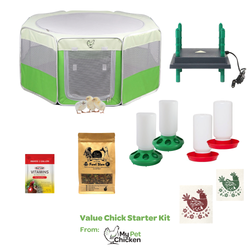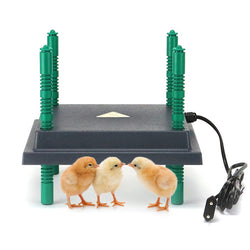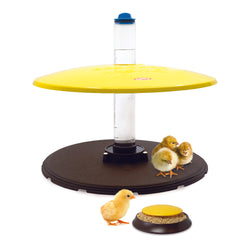Should I give my chicks medicated feed or unmedicated feed?
Back to blog
Medicated feed is formulated for chicks to help them combat coccidiosis, a disease that is found just about everywhere in the environment. Most medicated starter feeds contain the medication amprollium. Amprollium does not *treat* coccidiosis, but it helps the babies fight off cocci oocysts while they develop their own immunity. It is a preventative. If your birds have been vaccinated against coccidiosis, feeding them medicated feed will nullify the coccidiosis vaccination, although it will not hurt them. (We do not offer the coccidiosis vaccine, as it is too stressful on the birds--we offer the Marek's vaccine, which is not affected one way or the other by whether you use medicated feed.)

Most chick feeds, medicated or not, are formulated to be fed to babies who are no more than a few months old, but different brands have different suggested feeding periods. Some brands have a grower or developer feed that is meant to be given to babies between their chick starter and their layer feed. You will have to check the label of your particular brand of feed to see what the suggestions are for based on the formulations. Keep in mind that layer feed is not fed to growing birds because it contains too much calcium at the quantities they are eating, and chick feed (medicated or otherwise) is not fed to adult hens because it doesn't have enough calcium. A great deal of calcium is needed for the hens to produce strong eggshells. Medicated starter is not meant to be fed to laying hens, even if they were to become ill with coccidiosis. If an adult chicken were to fall ill to coccidiosis (which would be rare), the usual treatment is Sulmet, a sulfa drug. To reiterate, amprollium in medicated feed is not used to *treat* coccidiosis infections; it is a preventative used while the baby chickens are building their own resistance.
It is not really necessary to use medicated feed at all, although some people prefer to use it as a sort of insurance policy. You can use regular, unmedicated starter feed. Chicks can live and grow without medication (and have done for time out of mind), but in that case, their environments should be kept extra clean, since coccidia oocysts proliferate in wet environments. It is much easier to raise, say, 6 or 10 baby chicks with regular feed than it is to raise thousands in factory farm conditions. Conditions in factory farms often require medicated feed since the brooders are (sadly) not always kept clean and dry like you would keep them at home.

Most chick feeds, medicated or not, are formulated to be fed to babies who are no more than a few months old, but different brands have different suggested feeding periods. Some brands have a grower or developer feed that is meant to be given to babies between their chick starter and their layer feed. You will have to check the label of your particular brand of feed to see what the suggestions are for based on the formulations. Keep in mind that layer feed is not fed to growing birds because it contains too much calcium at the quantities they are eating, and chick feed (medicated or otherwise) is not fed to adult hens because it doesn't have enough calcium. A great deal of calcium is needed for the hens to produce strong eggshells. Medicated starter is not meant to be fed to laying hens, even if they were to become ill with coccidiosis. If an adult chicken were to fall ill to coccidiosis (which would be rare), the usual treatment is Sulmet, a sulfa drug. To reiterate, amprollium in medicated feed is not used to *treat* coccidiosis infections; it is a preventative used while the baby chickens are building their own resistance.
It is not really necessary to use medicated feed at all, although some people prefer to use it as a sort of insurance policy. You can use regular, unmedicated starter feed. Chicks can live and grow without medication (and have done for time out of mind), but in that case, their environments should be kept extra clean, since coccidia oocysts proliferate in wet environments. It is much easier to raise, say, 6 or 10 baby chicks with regular feed than it is to raise thousands in factory farm conditions. Conditions in factory farms often require medicated feed since the brooders are (sadly) not always kept clean and dry like you would keep them at home.



